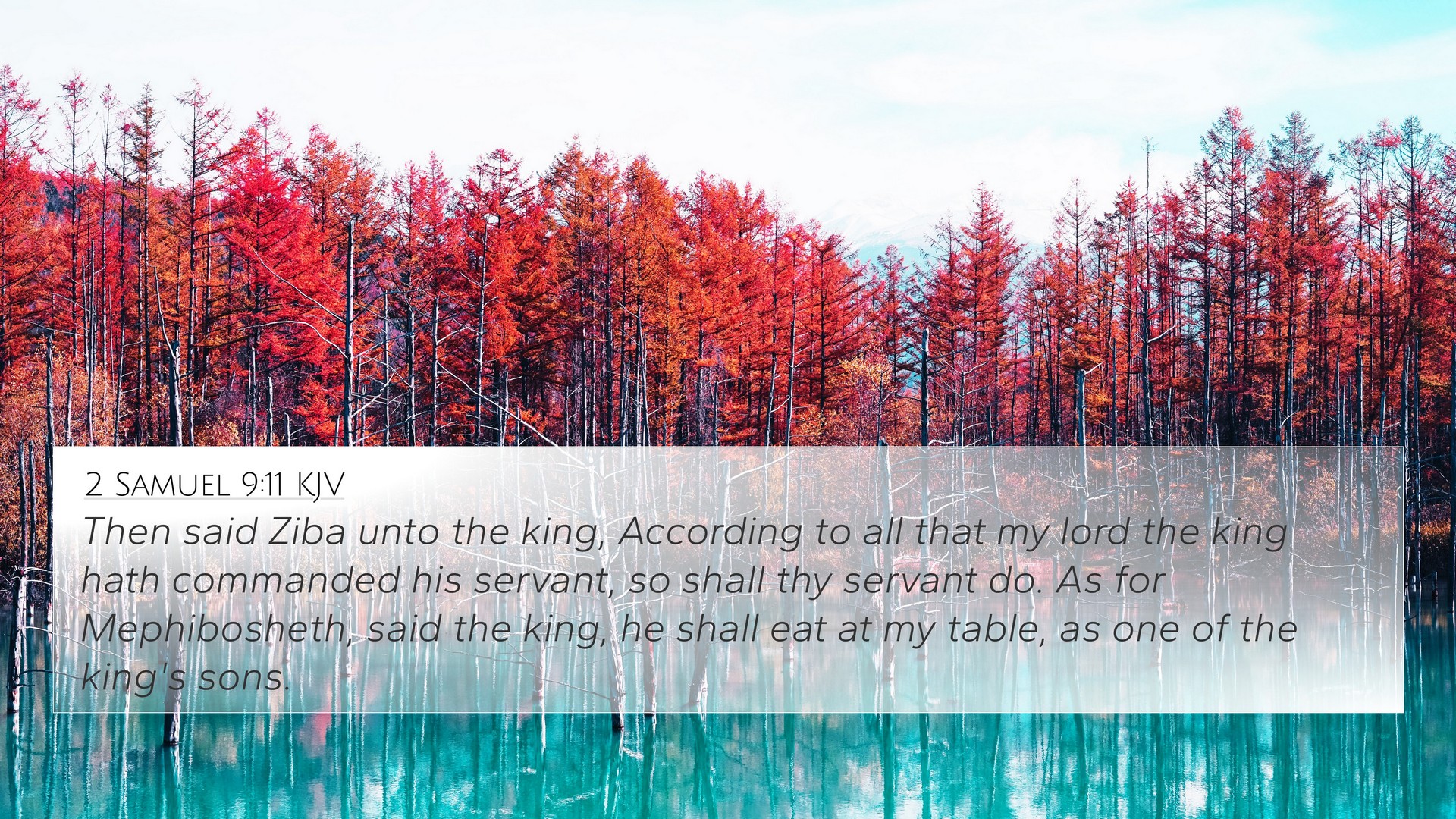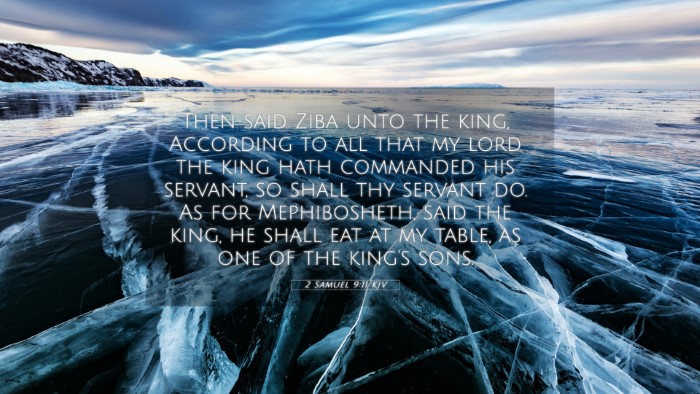Old Testament
Genesis Exodus Leviticus Numbers Deuteronomy Joshua Judges Ruth 1 Samuel 2 Samuel 1 Kings 2 Kings 1 Chronicles 2 Chronicles Ezra Nehemiah Esther Job Psalms Proverbs Ecclesiastes Song of Solomon Isaiah Jeremiah Lamentations Ezekiel Daniel Hosea Joel Amos Obadiah Jonah Micah Nahum Habakkuk Zephaniah Haggai Zechariah Malachi2 Samuel 9:11 Similar Verses
2 Samuel 9:11 Cross References
Then said Ziba unto the king, According to all that my lord the king hath commanded his servant, so shall thy servant do. As for Mephibosheth, said the king, he shall eat at my table, as one of the king's sons.
Uncover the Rich Themes and Topics of This Bible Verse
Listed below are the Bible themes associated with 2 Samuel 9:11. We invite you to explore each theme to gain deeper insights into the Scriptures.
2 Samuel 9:11 Cross Reference Verses
This section features a detailed cross-reference designed to enrich your understanding of the Scriptures. Below, you will find carefully selected verses that echo the themes and teachings related to 2 Samuel 9:11 KJV. Click on any image to explore detailed analyses of related Bible verses and uncover deeper theological insights.
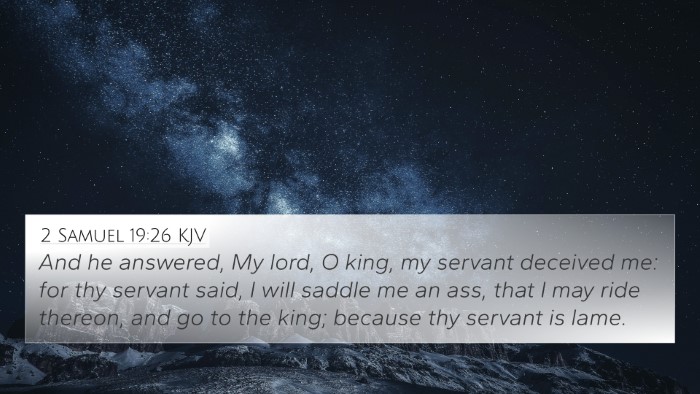
2 Samuel 19:26 (KJV) »
And he answered, My lord, O king, my servant deceived me: for thy servant said, I will saddle me an ass, that I may ride thereon, and go to the king; because thy servant is lame.
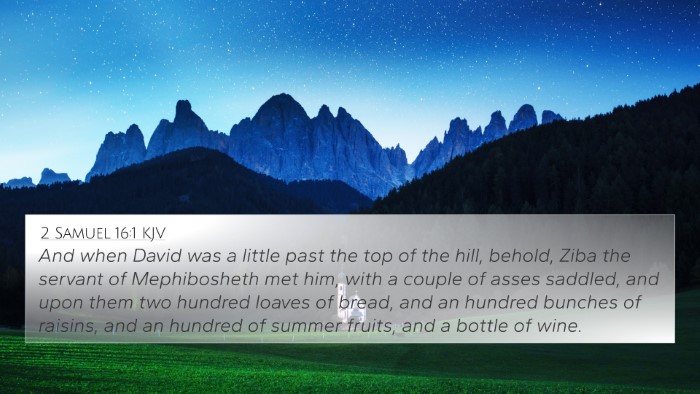
2 Samuel 16:1 (KJV) »
And when David was a little past the top of the hill, behold, Ziba the servant of Mephibosheth met him, with a couple of asses saddled, and upon them two hundred loaves of bread, and an hundred bunches of raisins, and an hundred of summer fruits, and a bottle of wine.
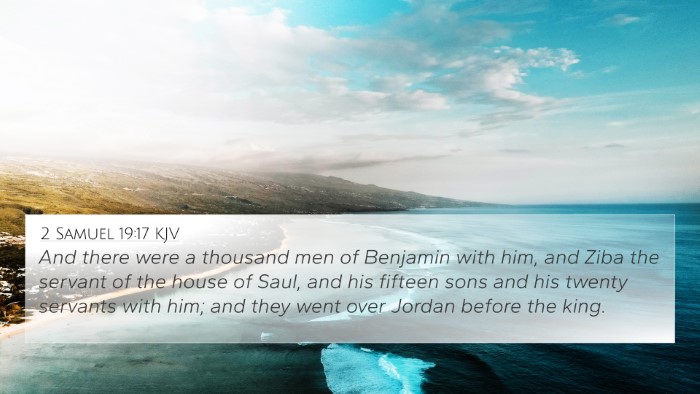
2 Samuel 19:17 (KJV) »
And there were a thousand men of Benjamin with him, and Ziba the servant of the house of Saul, and his fifteen sons and his twenty servants with him; and they went over Jordan before the king.
2 Samuel 9:11 Verse Analysis and Similar Verses
Understanding 2 Samuel 9:11
Verse: So Mephibosheth dwelt in Jerusalem; for he did eat continually at the king's table; and was lame on both his feet.
Overview
2 Samuel 9:11 illustrates the profound grace extended by King David towards Mephibosheth, the son of Jonathan. This verse captures themes of loyalty, kindness, and the fulfillment of promises. David's act of kindness is symbolic of God's grace toward humanity, reinforcing the biblical narrative of covenant loyalty and compassion.
Commentary Insights
-
Matthew Henry:
Henry emphasizes David's commitment to Jonathan's legacy through his kindness to Mephibosheth. The act of inviting him to dine at the king’s table signifies restoration and honor, demonstrating how God's grace can elevate a person from obscurity to prominence.
-
Albert Barnes:
Barnes highlights the significance of Mephibosheth's place in Jerusalem, suggesting it symbolizes security and peace. Eating at the king's table indicates not just provision, but an invitation to fellowship and participation in royal dignity, representing a special status and relationship with the king.
-
Adam Clarke:
Clarke notes that the mention of Mephibosheth being lame illustrates human frailty, yet it does not prevent him from enjoying royal privileges. This acts as a metaphor for believers who, despite their shortcomings, are welcomed into fellowship with God.
Thematic Connections
This verse serves as a pivotal point for exploring the broader themes within the Bible, particularly concerning grace and redemption. Several key themes emerge:
- Grace and Kindness: 2 Samuel 9:11 exemplifies grace as David reflects God’s kindness.
- Covenantal Relationships: The bond between David and Jonathan is pivotal, recalling God’s promise and loyalty.
- Redemption from Struggles: Just as Mephibosheth is restored, believers find redemption through Christ.
Cross-References
Several Bible verses interconnect with the themes found in 2 Samuel 9:11, revealing deeper insights:
- 1 Samuel 18:1-4: The covenant of friendship between David and Jonathan.
- 2 Samuel 4:4: Introduction to Mephibosheth's background and his physical condition.
- Luke 14:13-14: The principle of inviting the marginalized, reminiscent of David's actions.
- Romans 5:8: God's grace shown to the unworthy, akin to David's kindness to Mephibosheth.
- Ephesians 2:4-7: God’s mercy and grace towards sinners, paralleling Mephibosheth's elevation.
- Matthew 25:35: The call to receive those in need, similar to David’s treatment of Mephibosheth.
- Galatians 4:7: Being heirs through Christ reflects the sonship of Mephibosheth through David.
Practical Applications
Reflecting on 2 Samuel 9:11 can inspire various applications for daily living:
- Practicing Kindness: Look for opportunities to show grace toward others.
- Honoring Relationships: Uphold commitments made to friends and loved ones.
- Embracing Vulnerabilities: Recognize that weaknesses do not preclude us from blessings.
- Inviting Others to the Table: Include those who are marginalized in our lives.
Conclusion
2 Samuel 9:11 is a testament to the power of grace and the fulfillment of promises amid adversity. It serves not only as a historical narrative but as an enduring reminder of how we are called to extend kindness and hospitality to others, regardless of their circumstances. Through comparative analysis and thematic connections, believers are encouraged to see the broader implications of this scripture in light of God’s consistent faithfulness and lovingkindness throughout the Bible.
Further Study Tools
For those looking to delve deeper into cross-referencing Biblical texts and enhancing their understanding, consider utilizing:
- Bible concordances for thematic searches
- Cross-reference Bibles that provide interconnected scriptures
- Online Bible study tools that highlight inter-Biblical dialogues
- Study guides focusing on comparative Bible verse analysis
